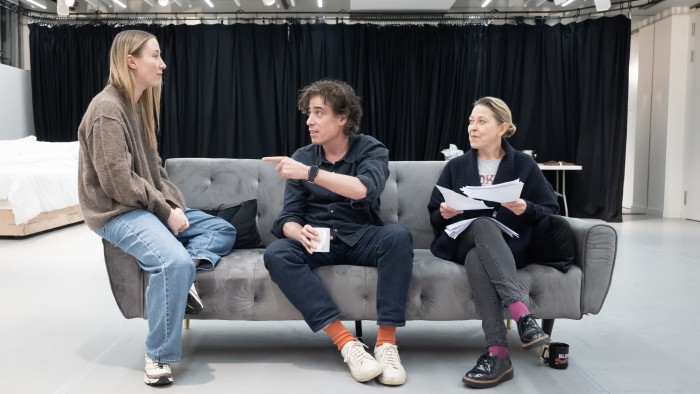Summarize this content to 2000 words in 6 paragraphs in Arabic Two’s company, three’s a crowd. So the saying goes, and it’s often a rule of thumb in drama, where even the hint of a third person can have drastic consequences for relationships. Think of Shakespeare’s Othello, Harold Pinter’s Betrayal — or pretty much any bedroom farce you care to name. Jealousy, pain and shame fuel the action, be it tragic or comic.So what if a couple actually chooses to expand? That’s the starting point for Mike Bartlett’s new play Unicorn. After 20 years of marriage, Polly and Nick decide to experiment with becoming a “throuple”, inviting a younger woman called Kate to join them.The fact that the couple are played by Nicola Walker and Stephen Mangan, who so memorably scoped out all the anguish of infidelity in Abi Morgan’s TV series The Split, only adds to the frisson. Here the two actors (joined by Erin Doherty as Kate) will be discussing fantasies, feelings and fears in the family kitchen. “You suddenly realise how much shame we all carry about sex and relationships,” says Bartlett, 44, when we meet during a break in rehearsals. “And how we don’t talk about it. So one of the things in the play is finding the words to talk about this stuff — and a theatre full of people seems like the right place to have a go at that.”Unicorn opens in London’s West End just before Valentine’s Day — which would make it an interesting first date for those who feel bold enough. And Bartlett has form with candour. Anyone who saw the premiere of his play Cock in 2009, which was similarly frank about sex, love and relationships, will remember the intensity of that experience. At one point a couple talked their way so precisely through a sex scene that they raised the temperature in the theatre without removing a single stitch of clothing.These are fictional people, but we can put them through the mill to vicariously explore stuff about ourselvesThe mischievous title of that play made a point. It was near-impossible to talk about it without wandering into smutty double entendres. When it comes to sex, the playwright suggested, we are often more comfortable giggling than talking. But both Cock, and now Unicorn, aim to reach through that into deeper questions about love, trust, intimacy and mortality.“There’s the traditional ménage à trois,” says Bartlett. “That’s not a life, it’s a moment. But then there are also people who are trying to create a full, ongoing, faithful relationship with three or four people. And that feels like something else. This play deals with both of those things in a way.”In one sense, Unicorn picks up where Cock left off. In the earlier play John, a young man on a break from a same-sex relationship, fell in love with a woman. In its articulation onstage of the complexity and fluidity of sexuality and identity, it felt daring in 2009. But John’s real dilemma was being forced to choose between two people. In Cock that leads to a great deal of heartache. In Unicorn the questions are differently framed.“It extends into whether it is possible to have an intimate, loving, faithful relationship with more than one person at the same time,” says Bartlett. “Can you have intimacy in a triangle? What would that look like? What stories could you tell?”Polly and Nick’s story, he says — neatly sidestepping any question about research — is not so much based in personal experience as personal knowledge: “When I have a character who is of a different identity to me expressing a specific experience that’s important, what I try to do is make sure that expression comes from someone who has said that: that I’ve absolutely heard it, and I respect it, and I don’t mess with that.”“You need, as an artist, to have freedom to play,” he adds. “At the same time you have big responsibilities to be truthful. [The stage] should be the ideal place to explore this stuff. These are fictional people, but we can put them through the mill to vicariously explore stuff about ourselves.”Bartlett is himself an intriguing individual. Quiet and courteous, he has the air of a thoughtful professor picking his way across the minefield of a tricky seminar. Yet his work is often strikingly audacious and “putting characters through the mill” is something at which he excels. His hit 2015 BBC drama Doctor Foster, about a GP’s life falling apart, demonstrated a Jacobean relish for psychological chaos, and onstage he strides into tricky territory with verve, precision and the ability to shape-shift with the subject.What first put him on the map were his short, sharp splinters of plays training the spotlight on a tight group of people — works such as Cock, or Bull (about office bullying) and Game (which shockingly combined video-game principles with the desperation of the housing market). Brilliant and blisteringly funny, they were also bracingly honest about how badly human beings can behave when in emotional pain.Then came more expansive dramas on huge themes. Albion (2017), a Chekhovian piece set in an Oxfordshire country garden, explored British identity. The scintillating Shakespearean epic King Charles III (2014), which Bartlett described as a “future history play”, depicted Charles’s accession and a constitutional crisis when the new monarch stands on principle. The 47th (2022) imagined the lead-up to a second Trump presidency. Both examined power — perceived, actual, shifting — and both were written in blank verse.What was fiction a few years ago has now come to pass. So how does the reality compare?“I was right about some things and some things didn’t happen,” says Bartlett, grinning. “Really The 47th was about whether the Democrats had an answer to Trump. In the play it was pretty clear that they didn’t — and it turned out they didn’t . . . You have to understand why, when he speaks, people listen.“And with King Charles III and Albion, it was trying to look at what we want Britain to be. We could really do with a great big public conversation about Britain.”Splitting his time across screen and stage, Bartlett values the way television can shift mainstream attitudes: “People get to know an individual character who they love and who is different from them: that’s a real power.”But even so, viewers can switch off, switch over or walk away. For him, it is theatre that can offer a potent response to today’s world and where the work can be boldest, whether personal or political. He quotes the writer and academic Bert O States’s description of theatre as “great reckonings in little rooms”.“I feel that if theatre didn’t exist right now, we would invent it as this radical new form because we need it,” he says. “[In the theatre] we focus, we do one thing, we imagine people who aren’t real, so no one’s going to get hurt, and then we explore stuff which is nuanced, complicated, difficult and not binary.“It’s shared and no one can switch it off. You are in and you’re going to have to deal with it. If you said, ‘What’s a great antidote to all the problems we have on social media and in public discourse?’, theatre would be it.”Unicorn, Garrick Theatre, London, February 4-April 25, unicorntheplay.co.ukFind out about our latest stories first — follow FT Weekend on Instagram and X, and sign up to receive the FT Weekend newsletter every Saturday morning
رائح الآن
rewrite this title in Arabic Playwright Mike Bartlett: ‘You realise how much shame we carry about sex’
مال واعمال
مواضيع رائجة
النشرة البريدية
اشترك للحصول على اخر الأخبار لحظة بلحظة الى بريدك الإلكتروني.
© 2026 جلوب تايم لاين. جميع الحقوق محفوظة.









